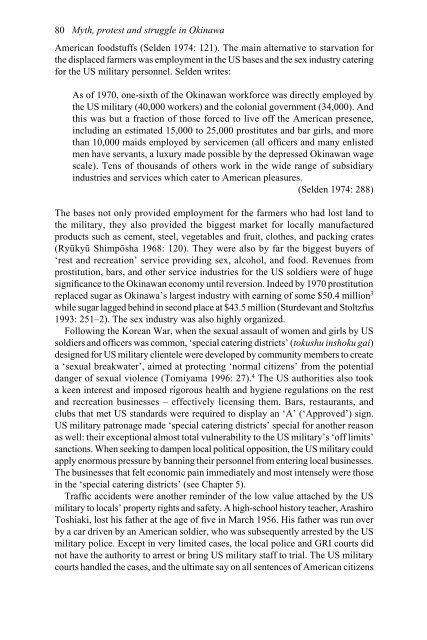Myth, Protest and Struggle in Okinawa
Myth, Protest and Struggle in Okinawa
Myth, Protest and Struggle in Okinawa
Create successful ePaper yourself
Turn your PDF publications into a flip-book with our unique Google optimized e-Paper software.
80 <strong>Myth</strong>, protest <strong>and</strong> struggle <strong>in</strong> Ok<strong>in</strong>awa<br />
American foodstuffs (Selden 1974: 121). The ma<strong>in</strong> alternative to starvation for<br />
the displaced farmers was employment <strong>in</strong> the US bases <strong>and</strong> the sex <strong>in</strong>dustry cater<strong>in</strong>g<br />
for the US military personnel. Selden writes:<br />
As of 1970, one-sixth of the Ok<strong>in</strong>awan workforce was directly employed by<br />
the US military (40,000 workers) <strong>and</strong> the colonial government (34,000). And<br />
this was but a fraction of those forced to live off the American presence,<br />
<strong>in</strong>clud<strong>in</strong>g an estimated 15,000 to 25,000 prostitutes <strong>and</strong> bar girls, <strong>and</strong> more<br />
than 10,000 maids employed by servicemen (all officers <strong>and</strong> many enlisted<br />
men have servants, a luxury made possible by the depressed Ok<strong>in</strong>awan wage<br />
scale). Tens of thous<strong>and</strong>s of others work <strong>in</strong> the wide range of subsidiary<br />
<strong>in</strong>dustries <strong>and</strong> services which cater to American pleasures.<br />
(Selden 1974: 288)<br />
The bases not only provided employment for the farmers who had lost l<strong>and</strong> to<br />
the military, they also provided the biggest market for locally manufactured<br />
products such as cement, steel, vegetables <strong>and</strong> fruit, clothes, <strong>and</strong> pack<strong>in</strong>g crates<br />
(Ryūkyū Shimpōsha 1968: 120). They were also by far the biggest buyers of<br />
‘rest <strong>and</strong> recreation’ service provid<strong>in</strong>g sex, alcohol, <strong>and</strong> food. Revenues from<br />
prostitution, bars, <strong>and</strong> other service <strong>in</strong>dustries for the US soldiers were of huge<br />
significance to the Ok<strong>in</strong>awan economy until reversion. Indeed by 1970 prostitution<br />
replaced sugar as Ok<strong>in</strong>awa’s largest <strong>in</strong>dustry with earn<strong>in</strong>g of some $50.4 million 3<br />
while sugar lagged beh<strong>in</strong>d <strong>in</strong> second place at $43.5 million (Sturdevant <strong>and</strong> Stoltzfus<br />
1993: 251–2). The sex <strong>in</strong>dustry was also highly organized.<br />
Follow<strong>in</strong>g the Korean War, when the sexual assault of women <strong>and</strong> girls by US<br />
soldiers <strong>and</strong> officers was common, ‘special cater<strong>in</strong>g districts’ (tokushu <strong>in</strong>shoku gai)<br />
designed for US military clientele were developed by community members to create<br />
a ‘sexual breakwater’, aimed at protect<strong>in</strong>g ‘normal citizens’ from the potential<br />
danger of sexual violence (Tomiyama 1996: 27). 4 The US authorities also took<br />
a keen <strong>in</strong>terest <strong>and</strong> imposed rigorous health <strong>and</strong> hygiene regulations on the rest<br />
<strong>and</strong> recreation bus<strong>in</strong>esses – effectively licens<strong>in</strong>g them. Bars, restaurants, <strong>and</strong><br />
clubs that met US st<strong>and</strong>ards were required to display an ‘A’ (‘Approved’) sign.<br />
US military patronage made ‘special cater<strong>in</strong>g districts’ special for another reason<br />
as well: their exceptional almost total vulnerability to the US military’s ‘off limits’<br />
sanctions. When seek<strong>in</strong>g to dampen local political opposition, the US military could<br />
apply enormous pressure by bann<strong>in</strong>g their personnel from enter<strong>in</strong>g local bus<strong>in</strong>esses.<br />
The bus<strong>in</strong>esses that felt economic pa<strong>in</strong> immediately <strong>and</strong> most <strong>in</strong>tensely were those<br />
<strong>in</strong> the ‘special cater<strong>in</strong>g districts’ (see Chapter 5).<br />
Traffic accidents were another rem<strong>in</strong>der of the low value attached by the US<br />
military to locals’ property rights <strong>and</strong> safety. A high-school history teacher, Arashiro<br />
Toshiaki, lost his father at the age of five <strong>in</strong> March 1956. His father was run over<br />
by a car driven by an American soldier, who was subsequently arrested by the US<br />
military police. Except <strong>in</strong> very limited cases, the local police <strong>and</strong> GRI courts did<br />
not have the authority to arrest or br<strong>in</strong>g US military staff to trial. The US military<br />
courts h<strong>and</strong>led the cases, <strong>and</strong> the ultimate say on all sentences of American citizens
















